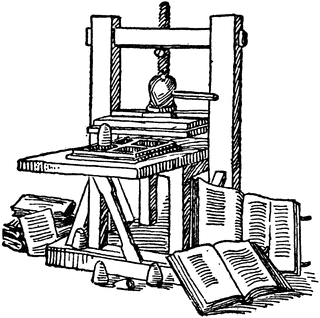 |
| Gutenberg's Printing Press. Image source: Clip Art Etc. |
In around 1440 the German Johannes Gutenberg invented the printing press and a whole new era of availability of books was introduced. His first book was the bible and suddenly an easier method of reading became common. There was still a long time before ordinary people could buy and read books, but civilization had changed for the better forever. Despite burnings and censorship, the book has survived for hundreds of years to this day.
Recently, while showing a friend who had an iPad that you did not need a Kindle to read eBooks - I noted that I had over 130 books available on my Kindle reader. This would take up an entire shelf in my bookcase in my house where I keep paper books accumulated over many years. I rarely buy paper versions of books any more - for two reasons: First - cost, ebooks are cheaper. Secondly - convenience. I can read a book review in the paper or hear an author plugging their book on the radio, and buy it straight away. I don't feel the longing for paper that many people who shun eReaders claim that they would never not buy paper.
One area where eBooks could have greatest benefit is in education. In one of my modules I recommend a statistics book by McClave and Sincich (2012), which is available as an eBook in the NCI Library via Dawson Era. However, due to publisher restrictions, it is only available to one student at a time for 2 hours - very restrictive. I'm informed that to make it available with no limits to my students would be prohibitive from a cost point of view. My students will have to continue to use one of the 32 paper copies of this book in the library holdings. Evidence from my own students is that not many buy the course texts and rely on the Library for paper copies. Clearly publishers see little profit in making eBooks available against selling a declining amount of paper copies. All evaluation copies of textbooks that I get are still paper versions - I would think that it would be easier and cheaper to make an eBook available to Lecturers.
For the moment books will survive the digital world - money controls everything.
No comments:
Post a Comment